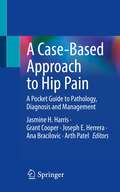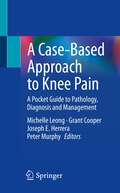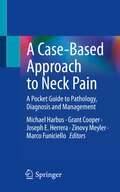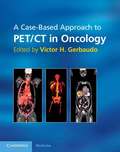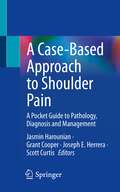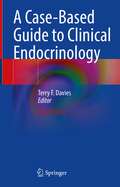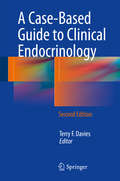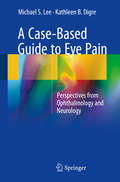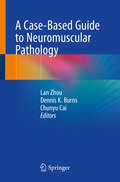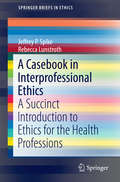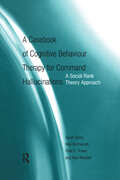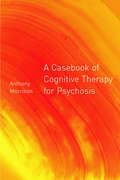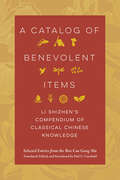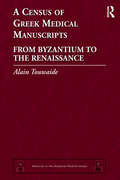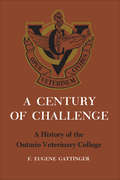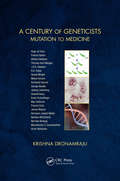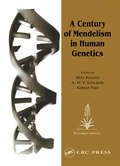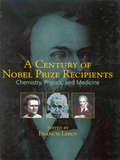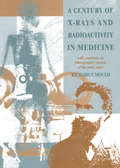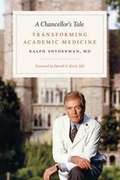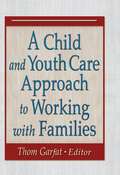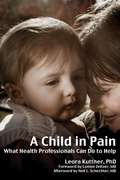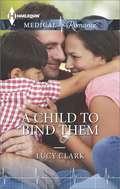- Table View
- List View
A Case-Based Approach to Hip Pain: A Pocket Guide to Pathology, Diagnosis and Management
by Grant Cooper Joseph E. Herrera Ana Bracilovic Jasmine H. Harris Arth PatelHip pain is one of the most common reasons for patient visits to orthopedic, physiatrist, primary care and sports medicine offices. Most books that cover this topic review it as a chapter within a larger book on orthopedics as a whole, or they focus on one specific aspect of hip pathology, such as osteoarthritis. This practical text is an evidence-based, user-friendly review of the literature for the breadth of hip pathologies that present to the busy practitioner. Opening with a review of the relevant anatomy, subsequent chapters discuss bursitis and tendonitis, labral tears, impingement syndrome, and osteoarthritis. Additional chapters cover hip pain in the pediatric patient, sports trauma and fractures, and rheumatologic and infectious disease considerations. And while reviewing pathology and its diagnosis and treatment is important, proceeding through real case studies is extremely valuable in bringing the diagnosis and treatment of hip pathologies to life, hence an engaging section of clinical case material rounds out the presentation.Taken together, A Case-Based Approach to Hip Pain will be an ideal resource for musculoskeletal medicine practitioners of all types.
A Case-Based Approach to Knee Pain: A Pocket Guide to Pathology, Diagnosis and Management
by Grant Cooper Peter Murphy Joseph E. Herrera Michelle LeongKnee pain is one of the most common reasons for patient visits to orthopedic, physiatrist, primary care and sports medicine offices. Most books that cover this topic review it as a chapter within a larger book on orthopedics as a whole, or they focus on one specific aspect of knee pathology, such as osteoarthritis.This practical text is an evidence-based, user-friendly review of the literature for the breadth of knee pathologies that present to the busy practitioner. Opening with a review of the relevant anatomy, subsequent chapters discuss injuries to ligaments and tendons, the meniscus, and osteoarthritis. Additional chapters cover knee pain in the pediatric patient, sports trauma and fractures, and rheumatologic and infectious disease considerations. And while reviewing pathology and its diagnosis and treatment is important, proceeding through real case studies is extremely valuable in bringing the diagnosis and treatment of knee pathologies to life, hence an engaging section of clinical case material rounds out the presentation.Taken together, A Case-Based Approach to Knee Pain will be an ideal resource for musculoskeletal medicine practitioners of all types.
A Case-Based Approach to Neck Pain: A Pocket Guide to Pathology, Diagnosis and Management
by Grant Cooper Joseph E. Herrera Zinovy Meyler Michael Harbus Marco FunicielloNeck pain is one of the most common reasons for patient visits to orthopedic, physiatrist, primary care and sports medicine offices. Most books that cover this topic review it as a chapter within a larger book on orthopedics as a whole, or they focus on one specific aspect of spinal pathology.This practical text is an evidence-based, user-friendly review of the literature for the breadth of cervical injuries and conditions that present to the busy practitioner. Opening with a review of the relevant anatomy, subsequent chapters discuss strains and sprains, facet joint and discogenic pain, radiculopathy and myelopathy. Additional chapters cover sports trauma and fractures as well as rheumatologic causes and considerations. And while reviewing pathology and its diagnosis and treatment is important, proceeding through real case studies is extremely valuable in bringing the diagnosis and treatment of neck pathologies to life, hence an engaging section of clinical case material rounds out the presentation.Taken together, A Case-Based Approach to Neck Pain will be an ideal resource for musculoskeletal medicine practitioners of all types.
A Case-Based Approach to Pet/Ct in Oncology
by Victor H. GerbaudoA Case-Based Approach to PET/CT in Oncology describes the role of PET/CT in the diagnosis, staging and monitoring of treatment response in today's practice of oncology. It provides a detailed analysis of over 100 cases occurring in daily clinical practice, emphasizing the central role that PET imaging plays in the care of cancer patients. The text is organized into two sections; Part I guides the reader through general introductory concepts, including basic science, while Part II covers in-depth oncologic applications. Each case is illustrated throughout with full color images and explains the key management issues and the advantages and limitations of the modality. Written by a team of renowned international experts, A Case-Based Approach to PET/CT in Oncology is an invaluable resource for all imaging practitioners, oncologists and nuclear medicine specialists.
A Case-Based Approach to Shoulder Pain: A Pocket Guide to Pathology, Diagnosis and Management
by Grant Cooper Joseph E. Herrera Scott Curtis Jasmin HarounianShoulder pain is one of the most common reasons for patient visits to orthopedic, physiatrist, primary care and sports medicine offices. Most books that cover this topic review it as a chapter within a larger book on orthopedics as a whole, or they focus on one specific aspect of shoulder pathology, such as osteoarthritis. This practical text is an evidence-based, user-friendly review of the literature for the breadth of shoulder pathologies that present to the busy practitioner. Opening with a review of the relevant anatomy, subsequent chapters discuss injuries to the rotator cuff, biceps tendonitis, labral tears, adhesive capsulitis, and osteoarthritis. Additional chapters cover shoulder pain in the pediatric patient, sports trauma and fractures, and medical causes of shoulder pain. And while reviewing pathology and its diagnosis and treatment is important, proceeding through real case studies is extremely valuable in bringing the diagnosis and treatment of shoulder pathologies to life, hence an engaging section of clinical case material rounds out the presentation.Taken together, A Case-Based Approach to Shoulder Pain will be an ideal resource for musculoskeletal medicine practitioners of all types.
A Case-Based Guide to Clinical Endocrinology
by Terry F. DaviesNow in a revised and expanded third edition, this case-based guide emphasizes the latest investigative advances in both imaging and molecular diagnostics and new treatment approaches for a wide variety of common and complex endocrine conditions. Utilizing unique clinical case histories, each main endocrine condition and disorder is curated by a senior Section Editor with an introduction to his or her area covering both physiology and pathophysiology. This introductory chapter is followed by a number of case histories written by invited experts and designed to cover the important relevant pathophysiology, following a consistent chapter format for ease of use, including bulleted objectives, case presentations, review of the diagnosis, lessons learned, and 3-5 multiple-choice review questions. Section headings include the pituitary, thyroid (overactivity, underactivity and cancer) and parathyroid, adrenal disorders, metabolic bone disease, type 2 diabetes, lipid abnormalities, obesity, and pregnancy. Topics new to this edition include PCOS, transgender medicine and the endocrine effects of viral infections.With a focus on covering major parts of the APDEM curriculum, A Case-Based Guide to Clinical Endocrinology remains a tremendous resource for junior and veteran clinicians alike.
A Case-Based Guide to Clinical Endocrinology (Contemporary Endocrinology)
by Terry F. DaviesIn A Case-Based Guide to Clinical Endocrinology, Second Edition, a renowned group of distinguished clinicians once again provides stimulating instruction and insights into a wide variety of endocrine topics, teaching readers modern management of the conditions described and offering targeted entry into the literature. Importantly, many of the important elements in the current curriculum for clinical endocrine training as recommended by the Association of Program Directors in Clinical Endocrinology, Diabetes and Metabolism are covered in this text. Thoroughly updated, this new edition not only covers new treatment approaches but also emphasizes the latest investigative advances in both imaging and molecular diagnostics. To reinforce learning and retention of knowledge, a question-based approach is used in many of the case studies. Students, residents, fellows, and practitioners will find this reference to be an efficient way to review their understanding and increase their skills and abilities in patient investigation and management. An invaluable contribution to the field, A Case-Based Guide to Clinical Endocrinology, Second Edition, offers the same comprehensive volume of thought-provoking case-studies that made the first edition of significant importance to all clinicians who treat patients with endocrine disorders.
A Case-Based Guide to Eye Pain: Perspectives from Ophthalmology and Neurology
by Michael S. Lee Kathleen B. DigreDiagnosing a patient with unexplained ocular pain can be time-consuming and difficult, but taking an anatomic approach and excluding causes along the way can aid in the diagnosis. This book provides the reader with a systematic evaluation plan for these cases, written and edited by leaders in the field. A Case-Based Guide to Eye Pain is written for both ophthalmologists and neuro-ophthalmologists since there are not enough neuro-ophthalmologists to treat the number of patients with unexplained ocular pain and general ophthalmologists are having to take on the diagnosis and treatment of these patients. Organized in an easy-to-use manner, each case covers the following key elements: the chief complaint, history of the present illness, the examination, assessment and plan, follow-up, alternate perspective, summary points, and key references. Tables are also available to help the reader rapidly sort through cases that may apply to a sign, symptom, historical feature, diagnostic test or treatment option. This allows the practitioner who has a patient with a particular concern to use the tables to identify a case discussion. Additionally, A Case-based Guide to Eye Pain includes an appendices with the general approach to eye pain and anatomy of the trigeminal pathway and its relation to eye pain.
A Case-Based Guide to Neuromuscular Pathology
by Lan Zhou Dennis K. Burns Chunyu CaiThis book provides a practical guide to the field of neuromuscular pathology including muscle, peripheral nerve, and skin biopsies with biopsy interpretation. Divided into three parts, the book begins with introductory chapters that review muscle, nerve, and skin biopsy indications and procedures, normal muscle and nerve histology, and common muscle and nerve pathology. The 28 myopathy case chapters in Part 2 and 11 neuropathy case chapters in Part 3 illustrate the clinical and pathological features of many neuromuscular diseases, demonstrate the indications and utilities of biopsies, discuss clinical and pathological differential diagnosis, update the individual disease management, and summarize pertinent clinical and pathology pearls for each case. A Case-Based Guide to Neuromuscular Pathology will function as an indispensable reference for neurologists and pathologists looking to understand the utility of muscle, nerve, and skin biopsies. This book will also aid neurology residents, neuromuscular fellows and neuropathology fellows in preparing for questions related to the muscle and nerve pathology in their in-service and board exams.
A Casebook in Interprofessional Ethics: A Succinct Introduction to Ethics for the Health Professions (SpringerBriefs in Ethics)
by Jeffrey P. Spike Rebecca LunstrothThe first ethics casebook that integrates clinical ethics (medical, nursing, and dental) and research ethics with public health and informatics. The book opens with five chapters on ethics, the development of interprofessional ethics, and brief instructional materials for students on how to analyze ethical cases and for teachers on how to teach ethics. In today's rapidly evolving healthcare system, the cases in this book are far more realistic than previous efforts that isolate the decision-making process by professions as if each is not embedded in a larger context that involves healthcare teams, hospital policies, and technology. The central claim of this book is that ethics is an important common ground for all of the health professions. Furthermore, when we recognize that our professions converge upon a common goal we will find less conflict and more pleasure in working together.
A Casebook of Cognitive Behaviour Therapy for Command Hallucinations: A Social Rank Theory Approach
by Sarah Byrne Max Birchwood Alan Meaden Peter E. TrowerCommand hallucinations are a particularly distressing and sometimes dangerous type of hallucination about which relatively little is known and for which no evidenced based treatment currently exists. In A Casebook of Cognitive Behaviour Therapy for Command Hallucinations the development of a new and innovative evidence based cognitive therapy is presented in a practical format ideal for the busy practitioner. This new approach is based on over a decade's research on the role of voice hearers' beliefs about the power and omnipotence of their voices and how this drives distress and 'acting on' voices. The therapy protocol is presented in clear steps from formulation to intervention. The body of the book describes its application in eight cases illustrating the breadth of its application, including 'complex' cases. The authors also present their interpretation of what their findings tell us about what works and doesn't work, and suggestions for future developments. Subjects covered also include: understanding command hallucinations a cognitive versus a quasi-neuroleptic approach to CBT in psychosis does CBT for CH work? findings from a randomised controlled trial. This book provides a fascinating and very practical summary of the first intervention to have a major impact on distress and on compliance with command hallucinations. It will be of great interest to all mental health practitioners working with people with psychosis in community and forensic settings.
A Casebook of Cognitive Therapy for Psychosis
by Anthony P. MorrisonThis book is a unique volume in which leading clinicians and researchers in the field of cognitive therapy for psychosis illustrate their individual approaches to the understanding of the difficulties faced by people with psychosis and how this informs intervention.Chapters include therapies focused on schizophrenia and individual psychotic symptoms such as hallucinations and delusions (including paranoia). Beck's original case study of cognitive therapy for psychosis from 1952 is reprinted, accompanied by his 50-year retrospective analysis. Also outlined are treatments for:• bipolar disorder • dual diagnosis • schema-focused approaches • early intervention to prevent psychosis • adherence to medicationThis book will be useful to clinicians and researchers alike, and will be an invaluable resource to mental health practitioners working with individuals experiencing psychosis.
A Catalog of Benevolent Items: Li Shizhen's Compendium of Classical Chinese Knowledge
by Li ShizhenDistills ten volumes, four dictionaries, and 1,800 years of knowledge into an authoritative introduction to the Ben cao gang mu. The Ben cao gang mu was the world’s most comprehensive encyclopedia of natural history and medicine when it was published in China in 1593. In fifty-two chapters, the physician Li Shizhen recorded two millennia of medical observations, interpreting the wide-ranging uses of plants, animals, minerals, and artificial substances and including countless verbatim quotations along with his own evaluations. Edited and translated by Paul U. Unschuld, A Catalog of Benevolent Items provides thoughtfully curated selections from the Ben cao gang mu, organized by theme. This anthology offers little-known details of China’s historical knowledge of nature; traditional Chinese medicine and its theoretical foundations; social and cultural facets of ancient Chinese civilization not documented elsewhere; and the information management of a sixteenth-century Chinese scholar.
A Census of Greek Medical Manuscripts: From Byzantium to the Renaissance (Medicine in the Medieval Mediterranean #6)
by Alain TouwaideManuscripts containing Greek medical texts were inventoried by author and work at the beginning of the 20th century by a group of philologists under the direction of Hermann Diels. Useful as it was - and will continue to be – Diels’ catalogue omitted authors and works, misidentified manuscripts, and overlooked codices. Furthermore, since the publication of the catalogue, some libraries have adopted a new system of classification, manuscripts have been destroyed, items have changed location, and new ones have come to light. The present Census is a checklist of the Greek medical manuscripts currently known in collections worldwide. It is both an amended and updated index of Diels’ catalogue, and a list of the items missed or overlooked in Diels, or located since. Although it does not supersede Diels’ catalogue, it is the indispensable instrument for a New Diels, and will be the reference for years to come for any new critical edition and medico-historical research based on manuscripts, besides providing the basis for a broad range of other historical inquiries, from codicology to the history of medicine and science, including Byzantine intellectual history, Renaissance studies and humanism, history of the book and early printing, and the history of medical philology and learning.
A Century of Challenge: A History of the Ontario Veterinary College
by Friston Eugene GattingerIn lively fashion Mr. Gattinger records the development of the Ontario Veterinary College, the oldest continuously operating veterinary school in this hemisphere. Viewing its history from the perspective of today, he sees the College and the profession it serves moving in response to the times, from a discipline centred mainly on the study of equine diseases to a highly specialized field of endeavour contributing to the research and technological advances of the modern age. Under its five principals the College has in each era of its history been the training-ground of experts in an important aspect of the agricultural industry, and its adaptation to changing conditions and to the personalities of its successive leaders, in Mr. Gattinger's view, makes it a striking example of the theory put forward by Professor Toynbee of growth through challenge and response. In celebrating its hundredth anniversary the College thus pays tribute to its founders and to the several generations of teachers and research workers who have served it.
A Century of Geneticists: Mutation to Medicine
by Krishna DronamrajuGenetics, like all scientific disciplines, is a human endeavor. Thus, the lives of geneticists - their friendships, colleagues and associations - play an important role in the historical development of the science. This book summarizes the history of genetics by reviewing the lives of the prominent and influential researchers beginning with the earliest and simplest branches of genetics (studies of inheritance and mutation) and ending with the human genome project - the pinnacle of genetics research of the 20th century. Key selling features: Summarizes the lives of important genetics researchers Reviews the development of important foundational concepts Highlights the way new technologies and methods have advanced the study of genetics Explores the influence of genetics in other biomedical fields Avoids simplistic chronological summary of genetics
A Century of Mendelism in Human Genetics
by Milo Keynes A.W.F. Edwards Robert PeelIn 1901 William Bateson, Professor of Biology at Cambridge, published a renewed version of a lecture which he had delivered the year before to the Royal Horticultural Society in London (reprinted in the book as an appendix). In this lecture he recognized the importance of the work completed by Gregor Mendel in 1865, and brought it to the notice of
A Century of Nobel Prize Recipients: Chemistry, Physics, and Medicine
by Francis LeroyCelebrating a century of revolutionary contributions to our understanding of life, the world, and the universe, this encyclopedic desk reference traces the discoveries that earned nearly 500 distinguished scientists Nobel honors in the areas of chemistry, physics, and medicine. The School of Library Journal called it "...eye-catching... Original ar
A Century of X-Rays and Radioactivity in Medicine: With Emphasis on Photographic Records of the Early Years
by R.F MouldA Century of X-Rays and Radioactivity in Medicine: With Emphasis on Photographic Records of the Early Years celebrates three great discoveries-x-rays (1895), radioactivity (1896), and radium (1898)-and recalls the pioneering achievements that founded the new science of radiology and changed the face of medicine forever. Over 700 historical illustrations with full and informative captions are supported by short introductory essays to illuminate the fascinating radiological past in an easy-to-read style.The focus of this book is on the historically more interesting early years of discovery, invention, diagnosis, therapy, dosimetry, risk, and protection. Interspersed with a variety of radiological anecdotes, the photographic record is complemented by archival accounts of the pioneer scientists and physicians and their early patients. In the chapters on diagnostic techniques, radiotherapy, and nuclear medicine, the author contrasts old methods with newer technologies. He also includes two fascinating chapters on museum and industrial applications of radiography. The book is comprehensively indexed for easy retrieval of the wide variety of people, techniques, apparatus, and examples featured throughout this radiological journey.
A Chancellor's Tale: Transforming Academic Medicine
by Ralph SnydermanDuring his fifteen years as chancellor, Dr. Ralph Snyderman helped create new paradigms for academic medicine while guiding the Duke University Medical Center through periods of great challenge and transformation. Under his leadership, the medical center became internationally known for its innovations in medicine, including the creation of the Duke University Health System--which became a model for integrated health care delivery--and the development of personalized health care based on a rational and compassionate model of care. In A Chancellor's Tale Snyderman reflects on his role in developing and instituting these changes. Beginning his faculty career at Duke in 1972, Snyderman made major contributions to inflammation research while leading the Division of Rheumatology and Immunology. When he became chancellor in 1989, he learned that Duke's medical center required bold new capabilities to survive the advent of managed care and HMOs. The need to change spurred creativity, but it also generated strong resistance. Among his many achievements, Snyderman led ambitious institutional growth in research and clinical care, broadened clinical research and collaborations between academics and industry, and spurred the fields of integrative and personalized medicine. Snyderman describes how he immersed himself in all aspects of Duke's medical enterprise as evidenced by his exercise in "following the sheet" from the patient's room to the laundry facilities and back, which allowed him to meet staff throughout the hospital. Upon discovering that temperatures in the laundry facilities were over 110 degrees he had air conditioning installed. He also implemented programs to help employees gain needed skills to advance. Snyderman discusses the necessity for strategic planning, fund-raising, and media relations and the relationship between the medical center and Duke University. He concludes with advice for current and future academic medical center administrators. The fascinating story of Snyderman's career shines a bright light on the importance of leadership, organization, planning, and innovation in a medical and academic environment while highlighting the systemic changes in academic medicine and American health care over the last half century. A Chancellor's Tale will be required reading for those interested in academic medicine, health care, administrative and leadership positions, and the history of Duke University.
A Child and Youth Care Approach to Working with Families
by Thom GarfatUse this newly developed family-oriented approach to be a better youth worker! In A Child and Youth Care Approach to Working with Families, practitioners and trainers in a new child methodology show you how to expand your youth program to involve family work using the Child and Youth Care Approach. This book provides a new way of looking at work with families in which the helpers are involved in the daily life of the families they are supporting. This book will be valuable to practitioners and instructors of the Child and Youth Care Approach as well as to youth workers, foster parents, and social workers who want to develop their own knowledge and skills in working with families. A Child and Youth Care Approach to Working with Families is designed to help youth care workers engage in a working relationship with young people and families that can facilitate change and allow families to live together more effectively with less stress. This book emphasizes that the family be involved in the care and treatment of young people. The authors reveal methods for connecting with each family by reflecting their rules, roles, culture, rhythm, timing, and style. This book will help you: develop your proficiency with the Child and Youth Care Approach to working with families shift from working in residential-only programs to in-home family prevention create as many moments of connection as possible among family members learn what boundaries need to be maintained to gain credibility with families provide effective supervision for staff working with families create activity-oriented family-focused work to develop family relationships and more! The authors of A Child and Youth Care Approach to Working with Families offer unique insight into the successes and failures of those who have moved into this area of helping troubled youths and adolescents. Special features of this book include specific learning exercises and short stories and case scenarios for you to practice alone or with your colleagues, as well as tables and figures. This book will introduce students, practitioners, and programs directors fully to this latest development in the field and help them engage more effectively with families. All royalties from this book will go to support CYC-Net (www.cyc-net.org).
A Child in Pain: What Health Professionals Can Do to Help
by Leora Kuttner Lonnie Zeltzer Neil SchechterThis comprehensive book is designed to help health professionals of all disciplines who work with children gain understanding and skill in how to approach and treat children's pain, and help children understand and cope with their own pain. Pain is the most common reason for children to seek a medical consultation - and sometimes the most common reason for avoiding it. This book examines children's fears and anxieties that accompany their need for pain relief, and gives health professionals communication skills and words to calm these fears. Without doubt, this volume will become a standard on pediatric pain management for many years to come. Book jacket.
A Child to Bind Them
by Lucy ClarkThe ties that bind... Dr. Cora Wilton loves working in her remote tropical paradise...who needs a man anyway? But when a storm hits the Pacific island of Tarparnii, Cora finds herself swept out of danger and into the arms of her very own superhero...drop-dead-gorgeous ex-army doc Archer Wild! Wild by name, wild by nature, Archer isn't ready for a commitment of any kind...but there's something about Cora that intrigues him. Could caring for adorable little storm orphan Nee-Ty finally heal their hearts and bind Cora and Archer together...forever?
A Child to Call Her Own: A Heartwarming Medical Romance (Dell Owen Hospital #2)
by Gill SandersonThe second novel in Gill Sanderson's delightful Dell Owen series, perfect for fans of Mia Faye, Laura Scott, Helen Scott Taylor, Grey's Anatomy and ER.Readers love Gill's gripping medical romances!'Remarkable writer!!' 5* author review 'A truly wonderful writer' 5* author review 'I find all of Gill Sanderson's books very readable and enjoy the escapism they give me' 5* author review Midwife Maria Wyatt loved her new job and enjoyed working with her new boss, Dr Tom Ramsey. After the two quickly became friends, Maria began to wonder if it was possible that they might become more than friends. But there was a problem. Some little time ago Tom's beloved wife had died and he reacted to her death by avoiding all further emotional upset.There was another problem - Tom's loveable four year old son James. Maria's young son - also named James - had died as a toddler. Could Maria and Tom put aside the traumas of their pasts and find happiness together?Don't miss Gill Sanderson's captivating medical romances, including the A Lakeland Practice and the Good, Bad and Ugly series.
A Child to Call Her Own: A Heartwarming Medical Romance (Dell Owen Hospital Ser. #2)
by Gill SandersonThe second novel in Gill Sanderson's delightful Dell Owen series, perfect for fans of Mia Faye, Laura Scott, Helen Scott Taylor, Grey's Anatomy and ER.Readers love Gill's gripping medical romances!'Remarkable writer!!' 5* author review 'A truly wonderful writer' 5* author review 'I find all of Gill Sanderson's books very readable and enjoy the escapism they give me' 5* author review Midwife Maria Wyatt loved her new job and enjoyed working with her new boss, Dr Tom Ramsey. After the two quickly became friends, Maria began to wonder if it was possible that they might become more than friends. But there was a problem. Some little time ago Tom's beloved wife had died and he reacted to her death by avoiding all further emotional upset.There was another problem - Tom's loveable four year old son James. Maria's young son - also named James - had died as a toddler. Could Maria and Tom put aside the traumas of their pasts and find happiness together?Don't miss Gill Sanderson's captivating medical romances, including the A Lakeland Practice and the Good, Bad and Ugly series.
